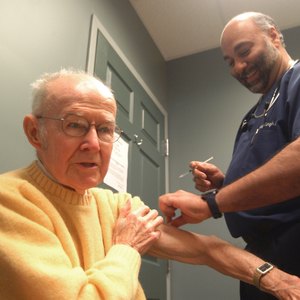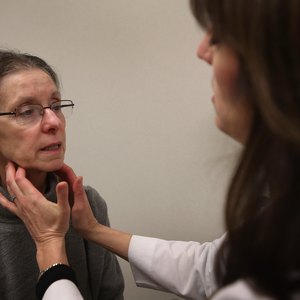
Canada's health care system is often mistakenly thought of as "free." In fact, Canadians pay for health care through taxes, low monthly or yearly premiums, and in some cases, out-of-pocket payments for non-insured services. Under the Canada Health Care Act of 1986, Canadians have universal access to health care, irrespective of income, employment, status, age or state of health. The administration of most services is provided provincially however, and differs from province to province.
Pro: Universal Access to Health Care for All

Canada’s heath care system ensures that a basic level of coverage is available to all who meet minimum requirements of residency. This means that students, unemployed individuals, pensioners and disabled are covered irrespective of their ability to work. Pregnancies, baby wellness and related health care is usually covered by the health care net.
Con: Priority Assessment Means Some Must Wait Longer

Non-emergency surgeries, tests and treatments are assessed and handled on a priority basis. Specialists visits are also scheduled according to priority. Those with life-threatening conditions, senior citizens and urgent needs get priority status, sometimes resulting in long waits for other patients.
Pro: Landmark Public Education Programs to Reduce Costs

Many provinces have developed social programs to educate the public on injury prevention and other safety issues. Landmark health programs that have helped to increase public awareness of health risks are often funded by government grants directed toward minimizing or reducing health care costs. Examples of such programs and studies include back injury awareness campaigns, social and health care support for disabled populations, and programs aimed at increasing awareness by seniors of the need to use canes and other assistive devices.
Con: Critics Argue Fee Limits are Out of Sync with Cost of Living

In an effort to keep health care costs down, the government puts a cap on what health care providers can charge. Physicians argue that these caps can restrict their earning potential and limit the providers’ ability to cover costs, pay for their student loans and keep pace with the cost of living.
Pro: Comprehensive Coverage for Veterans in Elder Years

Health care for veterans is covered by the federal government. These services are not limited to service-related injuries and illnesses as they are in the United States. This means that the veteran receives more comprehensive health care and social services that includes nursing home care and other treatments in elder years.
Con: Rural Populations May Not Get Equal Distribution of Care

Health care dollars are distributed according to provincial demographics, which means that rural areas often receive less funding than large metropolitan areas. Critics complain as a result, that rural health facilities are improved at a slower rate, and that the lack of dollars in the rural areas results in a shortage of doctors and specialists. Rural residents often have to travel long distances to see specialists within their health care districts.
References
- Medhunters.com
- True Cost. “List Of Countries With Universal Healthcare,” Accessed Nov. 2, 2019.
- HealthAffairs. “US Physician Practices Versus Canadians: Spending Nearly Four Times As Much Money Interacting With Payers,” Accessed Nov. 2, 2019.
- Population Health Management. "The Impact of Personalized Preventive Care on Health Care Quality, Utilization, and Expenditures," Accessed Dec. 28, 2019.
- CDC. “Emergency Room Use Among Adults Aged 18-64: Early Release Of Estimates From The National Health Interview Survey, January-June 2011,” Accessed Nov. 2, 2019.
- CDC. “Early Childhood Education,” Accessed Nov.2, 2019.
- Center for Disease Control. “Health and Economic Costs of Chronic Diseases,” Accessed Dec. 24, 2019.
- Medical Expenditure Panel Survey. “The Concentration of Health Care Expenditures and Related Expenses for Costly Medical Conditions, 2012,” Accessed Dec. 28, 2019.
- American Medical Association. “Medicare Clinical Laboratory Fee Schedule Proposed Cuts to Payment,” Accessed Dec. 28, 2019.
- Canadian Institute for Health Information. Download “National Health Expenditure Trends, 1975 to 2019: Data Tables — Series F,” Table F.1.1.4. Accessed Dec. 28, 2019.
- Princeton University. "Health Care Reform: Learning from Other Major Health Care Systems," Accessed Nov. 25, 2019.
- American Journal of Public Health. "Universal Health Care: Lessons from the British Experience," Accessed Nov. 25, 2019.
- OECD. "Health Expenditures and Financing," Click on the drop down menu and select, "per capita, current prices, current PPS." Accessed Nov. 25, 2019.
- World Health Organization. "Probability of Dying per 1,000 Live Births," Accessed Nov. 25, 2019.
- Government of Canada. “Canada’s Health Care System,” Accessed Nov. 2, 2019.
- New York University. "The French Health Care System," Accessed Nov. 25, 2019.
- National Center for Biotechnology Information. "Health Care in Germany," Accessed Nov. 25, 2019.
- SwissHealth. "Health Care System," Accessed Nov. 25, 2019.
- The Commonwealth Fund. "The English Health Care System," Accessed Nov. 25, 2019.
- U.S. Census. "Health Insurance Coverage in the United States: 2017," Accessed Nov. 25, 2019.
- Bernie. “Health Care As A Human Right – Medicare For All,” Accessed Nov. 2, 2019.
- The BMJ. “Medical Error – The Third Leading Cause Of Death In The US,” Accessed Nov. 2, 2019.
- World Health Organization. “What Is Health Financing For Universal Coverage?” Accessed Nov. 2, 2019.
- EPI, Agenda For Shared Prosperity. “Health Care For America,” Accessed Nov. 2, 2019.
- The White House, President Barack Obama. “The Economic Case For Health Care Reform: Update,” Page 6. Accessed Nov. 2, 2019.
- PNHP. "Understanding The Medicare For All Act Of 2019,” Accessed Nov. 2, 2019.
- The New England Journal Of Medicine. “Costs Of Health Care Administration In The United States And Canada,” Accessed Nov. 2, 2019.
Writer Bio
Jan Lee has been writing articles for approximately 20 years. Lee's articles and content have been published at Suite101, Examiner, BCAdventure, Columbus World Travel Guide and Go Northwest and appeared in publications in Canada, United States and Mexico. Lee received her Bachelors in Spanish from Simon Fraser University, Canada and is a 2004 Society of Professional Journalists' winner for Editorial Writing (Greater Oregon Chapter).

